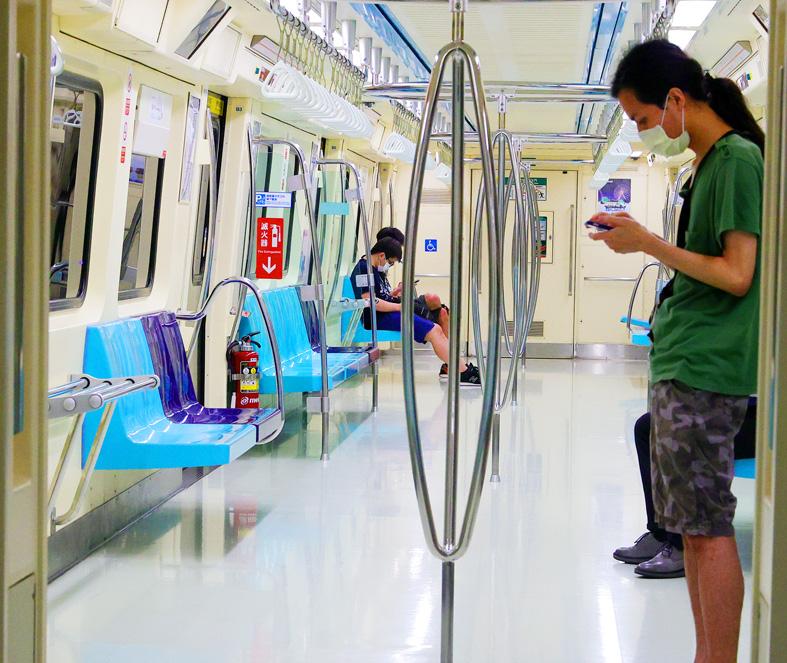The operators of the country’s four largest MRT metro rail systems have predicted combined losses of up to NT$10.156 billion (US$364.54 million) due to low ridership after the nationwide COVID-19 alert was raised to level 3 on May 19.
For the year, Taipei Rapid Transit Corp estimated losses of NT$5 billion to NT$8 billion, Taoyuan Metro Corp forecast NT$900 million in losses for its line from Taiwan Taoyuan International Airport to Taipei, Taichung Mass Rapid Transit System Co predicted losses of NT$656 million and Kaohsiung Rapid Transit Corp estimated NT$600 million in losses, the companies said on Saturday.
In 2019, the average daily ridership of the Taipei MRT system was 2.16 million people, which dropped slightly to about 2 million people from last year through April, Taipei Mayor Ko Wen-je (柯文哲) said on Friday.

Photo: CNA
However, after the pandemic alert was raised to level 3, daily ridership dropped to 430,000 people, he said, adding that it rose to 620,000 last month and just fewer than 1 million so far this month.
Taoyuan Metro said a lack of travelers entering the country through Taoyuan airport throughout the COVID-19 pandemic has had a large effect on its revenue.
The company said it has implemented cost-cutting measures and applied to the central government for subsidies.
It said it has asked the Ministry of Economic Affairs to reduce or waive its electricity fees, and has applied to the Ministry of Transportation and Communications for COVID-19 relief funding.
Ridership in Taichung over the past week has been about 10,000 people daily, one-fifth of the number recorded prior to May, Taichung Mass Rapid Transit chairman Lin Chih-ying (林志盈) said.
The company has lost NT$235 million over the past few months, and total losses for the year are expected to reach NT$656 million, he said.
The company has started cost-cutting measures, including better resource management, reducing electricity usage wherever possible and more cost-efficient maintenance of tracks and vehicles, he said.
Ridership on the Kaohsiung MRT hit a 13-year low in June, with only 11,970 people using the system on June 13 — its lowest ridership to date, Kaohsiung Rapid Transit said.
Currently, daily ridership is about 24,000 people, it said.
“When we saw that huge drop in ridership in June we were estimating that losses for the year would reach NT$1.3 billion,” it said. “However, with ridership now starting to recover, we are expecting losses for the year to be about NT$600 million.”
Combined its losses of NT$430 million last year, the company would have lost more than NT$1 billion by the end of this year, it said.
Additional reporting by Chou Min-hung and Ko Yu-hao

Taiwan has received more than US$70 million in royalties as of the end of last year from developing the F-16V jet as countries worldwide purchase or upgrade to this popular model, government and military officials said on Saturday. Taiwan funded the development of the F-16V jet and ended up the sole investor as other countries withdrew from the program. Now the F-16V is increasingly popular and countries must pay Taiwan a percentage in royalties when they purchase new F-16V aircraft or upgrade older F-16 models. The next five years are expected to be the peak for these royalties, with Taiwan potentially earning

STAY IN YOUR LANE: As the US and Israel attack Iran, the ministry has warned China not to overstep by including Taiwanese citizens in its evacuation orders The Ministry of Foreign Affairs (MOFA) yesterday rebuked a statement by China’s embassy in Israel that it would evacuate Taiwanese holders of Chinese travel documents from Israel amid the latter’s escalating conflict with Iran. Tensions have risen across the Middle East in the wake of US and Israeli airstrikes on Iran beginning Saturday. China subsequently issued an evacuation notice for its citizens. In a news release, the Chinese embassy in Israel said holders of “Taiwan compatriot permits (台胞證)” issued to Taiwanese nationals by Chinese authorities for travel to China — could register for evacuation to Egypt. In Taipei, the ministry yesterday said Taiwan

Taiwan is awaiting official notification from the US regarding the status of the Agreement on Reciprocal Trade (ART) after the US Supreme Court ruled US President Donald Trump's global tariffs unconstitutional. Speaking to reporters before a legislative hearing today, Premier Cho Jung-tai (卓榮泰) said that Taiwan's negotiation team remains focused on ensuring that the bilateral trade deal remains intact despite the legal challenge to Trump's tariff policy. "The US has pledged to notify its trade partners once the subsequent administrative and legal processes are finalized, and that certainly includes Taiwan," Cho said when asked about opposition parties’ doubts that the ART was

If China chose to invade Taiwan tomorrow, it would only have to sever three undersea fiber-optic cable clusters to cause a data blackout, Jason Hsu (許毓仁), a senior fellow at the Hudson Institute and former Chinese Nationalist Party (KMT) legislator, told a US security panel yesterday. In a Taiwan contingency, cable disruption would be one of the earliest preinvasion actions and the signal that escalation had begun, he said, adding that Taiwan’s current cable repair capabilities are insufficient. The US-China Economic and Security Review Commission (USCC) yesterday held a hearing on US-China Competition Under the Sea, with Hsu speaking on